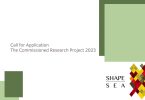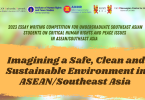 Strengthening Human Rights and Peace Research/Education in ASEAN/Southeast Asia Programme (SHAPE-SEA) and Routed Magazine are honoured to issue the special think piece series entitled ˜Moving towards a better normal: Defining mobility, human rights and freedoms in a post-pandemic Southeast Asia ™! We would like to thank the Routed Team namely, Shaddin Almasri, Lillian Babayan, Madison Bradt, Fiona Buchanan, Malin A. Evertsz Mendez, Lena Hartz, Margaret Koudelkova, Hannah Markay, Javier Ormeno, Magda RodrÃguez Dehli, for their unwavering commitment to this common project; Dr Khoo Ying Hooi of Universiti Malaya (GPF035-2020) and Ms Maya Dania of Mae Fah Luang University, our wonderful and dedicated guest editors for this issue.Southeast Asia is no stranger to life-changing disruptions caused by the COVID-19 pandemic. Public health systems and personnel were extremely exhausted. Mobility, in general, was put to a halt “ disproportionately affecting those whose means of living depends on it. Certain rights and freedoms were suspended to give way to public order and safety.Amid the massive spread of viral infections in many parts of the region, many governments and societies are surrendering to the fact that living with the virus might just be the only option to move towards a new normal. However, while restrictions on mobility and socio-economic activities are cautiously being eased, their impacts on human rights and fundamental freedoms have yet to be fully addressed. Democratic backsliding and a heightened securitisation of societies have left vulnerable populations hanging by a thread.This special series aims to foster critical consciousness on lived experiences of (im)mobility, human rights, and freedoms. It seeks to elevate and include voices from the ground, specifically in relation to freedom of movement and the rights of people on the move seeking opportunities and a decent life. Ultimately, it aims to contribute to defining and owning a better normal for, and with everyone who considers Southeast Asia home.These think pieces cover critical topics concerning human rights and mobility, particularly capturing the lived experience of those at the margins, including internally displaced persons, migrant workers, stateless persons, LGBTIQ+ persons, academic activists, and human rights defenders.Our special series starts with ˜The challenge of protecting internally displaced persons in Southeast Asia ™ by UN Special Rapporteur on the Human Rights of Internally Displaced Persons Cecilia Jimenez-Damary. She asserts the urgent need for action to solve the issues of millions of IDPs in Southeast Asia who are forced to flee their homes. Tashny Sukumaran ™s ˜In Malaysia, oppressive policies marginalise migrant workers ™ delves into the precarious experience of migrant workers as they struggle to survive during the pandemic.Romina Abuan, in ˜COVID-19 and the migration cycle in Southeast Asia ™, explores the effects of the pandemic and the related preventative measures on the migration cycle in Southeast Asia; while in ˜What is waiting at home? Migrant workers ™ return, reintegration and remigration amid the COVID-19 pandemic ™, Katrina Guanio questions what happens when migrants are forced to return home without adequate preparation. Other migrants have struggled to come back to their home countries as borders closed. Cuc Thi Kim Nguyen and Dinh Duc Nguyen examine the legal plight of Vietnamese migrant workers stranded abroad in ˜How have travel restrictions due to the COVID-19 pandemic made the situation of Vietnamese migrant workers in Southeast Asia more precarious? ™. Migrants ™ ambivalent feelings towards border closures are also present in ˜Frustrated and angry voices from far away: Returning home amid the pandemic ™, by Wisnu Adihartono. Meanwhile, pandemic conditions and labour exploitation have also trapped migrant fishers at sea, as examined by Tashryn Mohd Shahrin and Euan Chan in ‹ ‹ ˜Mercy at sea in a post-pandemic world ™.Furthermore, the pandemic has created unequal challenges for different populations. Martin Petlach explores the impact of restrictions and returns on LGBTIQ+ communities in ˜Locked down and locked out: A review of the experience of LGBTIQ+ people of Southeast Asia amid the COVID-19 pandemic ™. Women migrant workers have also experienced the socio-economic toll of the pandemic through the prism of gender, as Myoh Minn Oo examines in ˜Pandemic rubs salt in the wound for women migrant workers in ASEAN ™. Patricia Miranda and Fatima Angkaya explain in ˜The sexual and reproductive health of migrants and mobile populations: Pandemic challenges in the Philippines ™ how these healthcare needs of migrants became eclipsed by COVID-19. Stateless people have also been made more vulnerable by the pandemic, often falling through the cracks of the healthcare and border control systems, as Saittawut Yutthaworakool shows in ˜The invisibility of the invisible lives: Being stateless in Thailand in times of the COVID-19 pandemic ™.The pandemic has followed and aggravated certain authoritarian tendencies. Cornelius Hanung offers some examples of using COVID-19 as a pretext to curtail freedoms and persecute activists across the region in ˜In the name of the public health emergency: An emerging challenge on the right to protest in Southeast Asia ™. The military coup in Myanmar has sent many citizens into exile, while also imposing new hardships on Myanmar migrants abroad, as they recount on ˜Stranded dreams: Myanmar migrant experiences in Thailand ™s tourism sector during COVID-19 and the military coup ™ by Sofie Mortensen. We also have the honour of publishing Dr MMT ™s testimony as a scholar at risk who has fled the regime, in ˜Let us live normally and in dignity: A note from a displaced citizen, daughter, mother, and scholar at risk ™.It is essential that institutions and civil society actors take into account these voices and experiences for building a safer, just, inclusive better normal for all, as pandemic realities slowly start to transform.We would like to thank the writers for their insightful and inspiring contributions, and you, our readers. We hope that this issue will make you reflect and engage in collectively shaping a brighter post-pandemic future in Southeast Asia and beyond!
Strengthening Human Rights and Peace Research/Education in ASEAN/Southeast Asia Programme (SHAPE-SEA) and Routed Magazine are honoured to issue the special think piece series entitled ˜Moving towards a better normal: Defining mobility, human rights and freedoms in a post-pandemic Southeast Asia ™! We would like to thank the Routed Team namely, Shaddin Almasri, Lillian Babayan, Madison Bradt, Fiona Buchanan, Malin A. Evertsz Mendez, Lena Hartz, Margaret Koudelkova, Hannah Markay, Javier Ormeno, Magda RodrÃguez Dehli, for their unwavering commitment to this common project; Dr Khoo Ying Hooi of Universiti Malaya (GPF035-2020) and Ms Maya Dania of Mae Fah Luang University, our wonderful and dedicated guest editors for this issue.Southeast Asia is no stranger to life-changing disruptions caused by the COVID-19 pandemic. Public health systems and personnel were extremely exhausted. Mobility, in general, was put to a halt “ disproportionately affecting those whose means of living depends on it. Certain rights and freedoms were suspended to give way to public order and safety.Amid the massive spread of viral infections in many parts of the region, many governments and societies are surrendering to the fact that living with the virus might just be the only option to move towards a new normal. However, while restrictions on mobility and socio-economic activities are cautiously being eased, their impacts on human rights and fundamental freedoms have yet to be fully addressed. Democratic backsliding and a heightened securitisation of societies have left vulnerable populations hanging by a thread.This special series aims to foster critical consciousness on lived experiences of (im)mobility, human rights, and freedoms. It seeks to elevate and include voices from the ground, specifically in relation to freedom of movement and the rights of people on the move seeking opportunities and a decent life. Ultimately, it aims to contribute to defining and owning a better normal for, and with everyone who considers Southeast Asia home.These think pieces cover critical topics concerning human rights and mobility, particularly capturing the lived experience of those at the margins, including internally displaced persons, migrant workers, stateless persons, LGBTIQ+ persons, academic activists, and human rights defenders.Our special series starts with ˜The challenge of protecting internally displaced persons in Southeast Asia ™ by UN Special Rapporteur on the Human Rights of Internally Displaced Persons Cecilia Jimenez-Damary. She asserts the urgent need for action to solve the issues of millions of IDPs in Southeast Asia who are forced to flee their homes. Tashny Sukumaran ™s ˜In Malaysia, oppressive policies marginalise migrant workers ™ delves into the precarious experience of migrant workers as they struggle to survive during the pandemic.Romina Abuan, in ˜COVID-19 and the migration cycle in Southeast Asia ™, explores the effects of the pandemic and the related preventative measures on the migration cycle in Southeast Asia; while in ˜What is waiting at home? Migrant workers ™ return, reintegration and remigration amid the COVID-19 pandemic ™, Katrina Guanio questions what happens when migrants are forced to return home without adequate preparation. Other migrants have struggled to come back to their home countries as borders closed. Cuc Thi Kim Nguyen and Dinh Duc Nguyen examine the legal plight of Vietnamese migrant workers stranded abroad in ˜How have travel restrictions due to the COVID-19 pandemic made the situation of Vietnamese migrant workers in Southeast Asia more precarious? ™. Migrants ™ ambivalent feelings towards border closures are also present in ˜Frustrated and angry voices from far away: Returning home amid the pandemic ™, by Wisnu Adihartono. Meanwhile, pandemic conditions and labour exploitation have also trapped migrant fishers at sea, as examined by Tashryn Mohd Shahrin and Euan Chan in ‹ ‹ ˜Mercy at sea in a post-pandemic world ™.Furthermore, the pandemic has created unequal challenges for different populations. Martin Petlach explores the impact of restrictions and returns on LGBTIQ+ communities in ˜Locked down and locked out: A review of the experience of LGBTIQ+ people of Southeast Asia amid the COVID-19 pandemic ™. Women migrant workers have also experienced the socio-economic toll of the pandemic through the prism of gender, as Myoh Minn Oo examines in ˜Pandemic rubs salt in the wound for women migrant workers in ASEAN ™. Patricia Miranda and Fatima Angkaya explain in ˜The sexual and reproductive health of migrants and mobile populations: Pandemic challenges in the Philippines ™ how these healthcare needs of migrants became eclipsed by COVID-19. Stateless people have also been made more vulnerable by the pandemic, often falling through the cracks of the healthcare and border control systems, as Saittawut Yutthaworakool shows in ˜The invisibility of the invisible lives: Being stateless in Thailand in times of the COVID-19 pandemic ™.The pandemic has followed and aggravated certain authoritarian tendencies. Cornelius Hanung offers some examples of using COVID-19 as a pretext to curtail freedoms and persecute activists across the region in ˜In the name of the public health emergency: An emerging challenge on the right to protest in Southeast Asia ™. The military coup in Myanmar has sent many citizens into exile, while also imposing new hardships on Myanmar migrants abroad, as they recount on ˜Stranded dreams: Myanmar migrant experiences in Thailand ™s tourism sector during COVID-19 and the military coup ™ by Sofie Mortensen. We also have the honour of publishing Dr MMT ™s testimony as a scholar at risk who has fled the regime, in ˜Let us live normally and in dignity: A note from a displaced citizen, daughter, mother, and scholar at risk ™.It is essential that institutions and civil society actors take into account these voices and experiences for building a safer, just, inclusive better normal for all, as pandemic realities slowly start to transform.We would like to thank the writers for their insightful and inspiring contributions, and you, our readers. We hope that this issue will make you reflect and engage in collectively shaping a brighter post-pandemic future in Southeast Asia and beyond!






